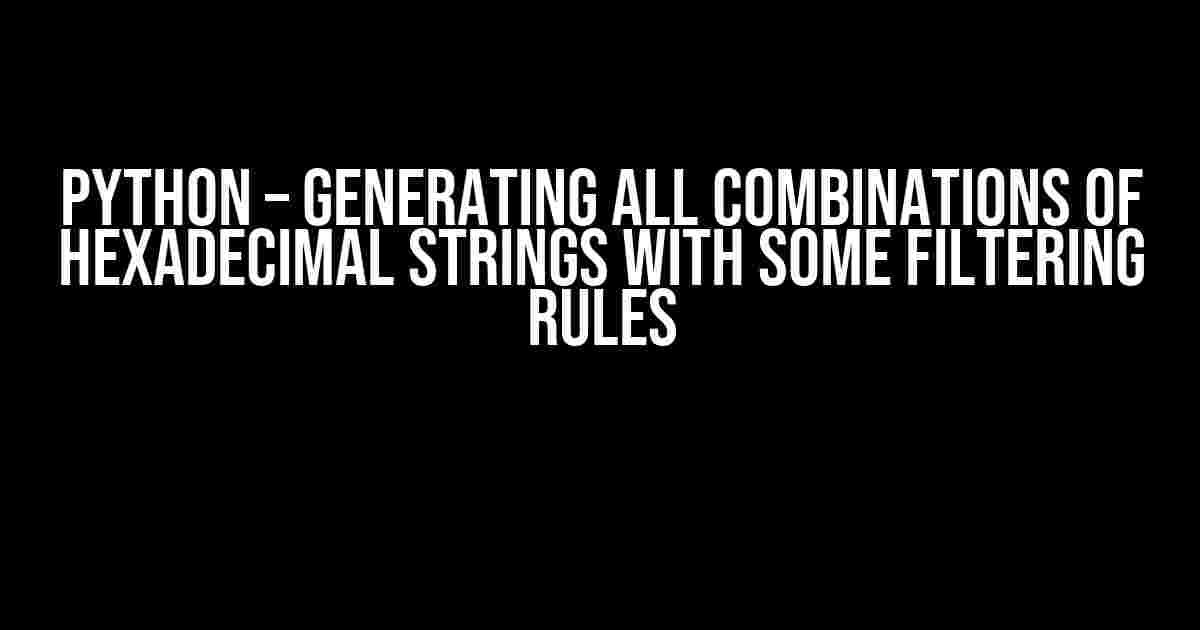Are you tired of manually generating hexadecimal strings and filtering them according to your specific needs? Do you want to automate this process and save time? Look no further! In this article, we will explore how to generate all possible combinations of hexadecimal strings using Python, and then filter them based on specific rules.
What are hexadecimal strings?
Hexadecimal strings are a way of representing binary data using only 16 distinct characters: 0-9 and A-F. They are commonly used in programming, networking, and cryptography. Hex strings can be used to represent colors, dates, and even entire files.
Why do we need to generate all combinations of hexadecimal strings?
Sometimes, we need to test or verify a system’s behavior with all possible inputs. In the case of hexadecimal strings, this means generating all possible combinations of characters. This can be useful in a variety of scenarios, such as:
- Generating test data for a system that accepts hexadecimal input
- Finding all possible solutions to a cryptographic puzzle
- Creating a comprehensive list of colors for a design project
Generating all combinations of hexadecimal strings using Python
To generate all combinations of hexadecimal strings, we can use Python’s built-in itertools module. Specifically, we will use the product function, which generates the cartesian product of multiple iterables.
import itertools
# Define the hexadecimal characters
hex_chars = '0123456789ABCDEF'
# Define the length of the hexadecimal string
length = 4
# Generate all combinations of hexadecimal strings
combinations = itertools.product(hex_chars, repeat=length)
# Convert the combinations to a list of strings
hex_strings = [''.join(p) for p in combinations]
# Print the first 10 combinations
print(hex_strings[:10])
This code generates all possible combinations of 4-character hexadecimal strings. You can adjust the length variable to generate strings of different lengths.
Filtering hexadecimal strings using Python
Once we have generated all possible combinations of hexadecimal strings, we can filter them based on specific rules. For example, let’s say we want to filter out strings that:
- Start with the character ‘A’
- Contain the substring ‘FF’
- Have an even number of characters
We can use Python’s built-in filter function and lambda functions to achieve this:
# Define the filtering rules
rules = [
lambda x: not x.startswith('A'),
lambda x: 'FF' not in x,
lambda x: len(x) % 2 != 0
]
# Apply the filtering rules
filtered_hex_strings = list(filter(lambda x: all(rule(x) for rule in rules), hex_strings))
# Print the first 10 filtered combinations
print(filtered_hex_strings[:10])
This code applies the filtering rules to the generated hexadecimal strings and returns a new list of strings that meet the specified criteria.
Example scenarios: applying filtering rules
Let’s consider a few example scenarios where we can apply filtering rules to the generated hexadecimal strings:
Scenario 1: Filtering out colors
Suppose we want to generate a list of colors for a design project, but we want to exclude certain colors that are too bright or too dark. We can use filtering rules to achieve this:
# Define the filtering rules
rules = [
lambda x: not x in ['FFFFFF', '000000'], # exclude white and black
lambda x: x != x[::-1], # exclude symmetric colors
lambda x: int(x, 16) > 0x808080 # exclude dark colors
]
# Apply the filtering rules
filtered_hex_strings = list(filter(lambda x: all(rule(x) for rule in rules), hex_strings))
# Print the first 10 filtered combinations
print(filtered_hex_strings[:10])
Scenario 2: Filtering out cryptographic hashes
Suppose we want to generate a list of cryptographic hashes for a security testing project, but we want to exclude certain hashes that are known to be weak or vulnerable. We can use filtering rules to achieve this:
# Define the filtering rules
rules = [
lambda x: not x in ['0011223344556677', '1234567890abcdef'], # exclude weak hashes
lambda x: x != x.upper(), # exclude hashes with all uppercase characters
lambda x: len(set(x)) > 10 # exclude hashes with low entropy
]
# Apply the filtering rules
filtered_hex_strings = list(filter(lambda x: all(rule(x) for rule in rules), hex_strings))
# Print the first 10 filtered combinations
print(filtered_hex_strings[:10])
Conclusion
In this article, we have explored how to generate all possible combinations of hexadecimal strings using Python’s itertools module, and then filter them based on specific rules using the filter function and lambda functions. By applying filtering rules, we can narrow down the list of generated hexadecimal strings to meet specific requirements or criteria.
This technique has a wide range of applications in various fields, including testing, security, and design. By mastering this technique, you can automate tedious tasks and focus on more creative and high-level problems.
Appendix: performance considerations
When generating and filtering large lists of hexadecimal strings, performance can become a concern. Here are some tips to optimize your code:
- Use a generator instead of a list to reduce memory usage
- Use a filtered generator instead of filtering a list
- Use a multi-core processor or distributed computing to parallelize the generation and filtering process
- Optimize your filtering rules to reduce the number of iterations
| Length of hexadecimal string | Number of combinations |
|---|---|
| 4 | 65536 |
| 8 | 4294967296 |
| 16 | 18446744073709551616 |
As you can see, the number of combinations grows exponentially with the length of the hexadecimal string. Be mindful of the performance implications when generating and filtering large lists of hexadecimal strings.
We hope this article has been informative and helpful in generating and filtering hexadecimal strings using Python. Happy coding!
Frequently Asked Question
Get ready to unlock the secrets of generating all combinations of hexadecimal strings with filtering rules in Python!
Q1: How can I generate all possible combinations of hexadecimal strings in Python?
You can use the `itertools.product` function in combination with the `string.hexdigits` constant to generate all possible combinations of hexadecimal strings. Here’s an example: `import itertools; import string; [”.join(p) for p in itertools.product(string.hexdigits, repeat=4)]`
Q2: How can I filter out combinations that contain a specific substring in Python?
You can use a list comprehension with a conditional statement to filter out combinations that contain a specific substring. For example: `combinations = [”.join(p) for p in itertools.product(string.hexdigits, repeat=4)]; filtered_combinations = [c for c in combinations if ‘bad’ not in c]`
Q3: How can I generate combinations of hexadecimal strings with a specific length in Python?
You can use the `repeat` parameter of the `itertools.product` function to specify the length of the combinations. For example: `combinations = [”.join(p) for p in itertools.product(string.hexdigits, repeat=6)]` will generate combinations of length 6.
Q4: How can I ignore case when filtering out combinations that contain a specific substring in Python?
You can use the `casefold()` method to ignore case when filtering out combinations. For example: `filtered_combinations = [c for c in combinations if ‘bad’.casefold() not in c.casefold()]`
Q5: How can I optimize the generation of combinations for large input strings in Python?
You can use generators instead of lists to optimize memory usage. For example: `combinations = (”.join(p) for p in itertools.product(string.hexdigits, repeat=4))` will generate combinations on-the-fly without storing them in memory.





